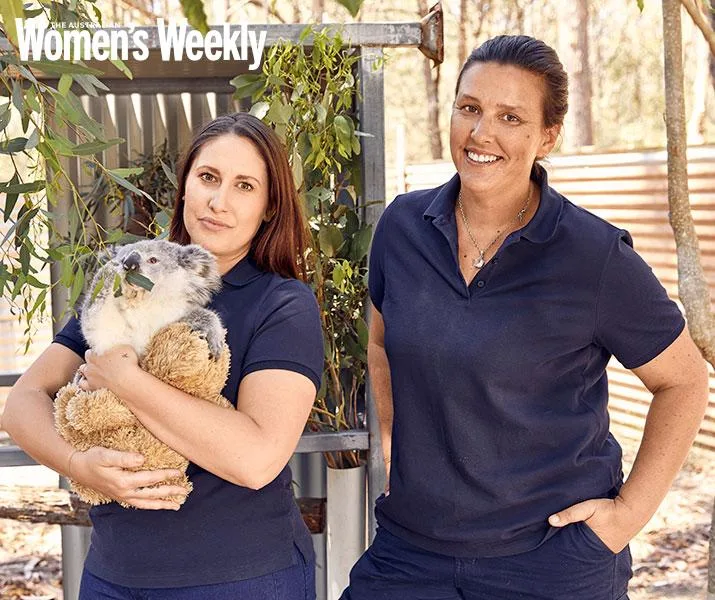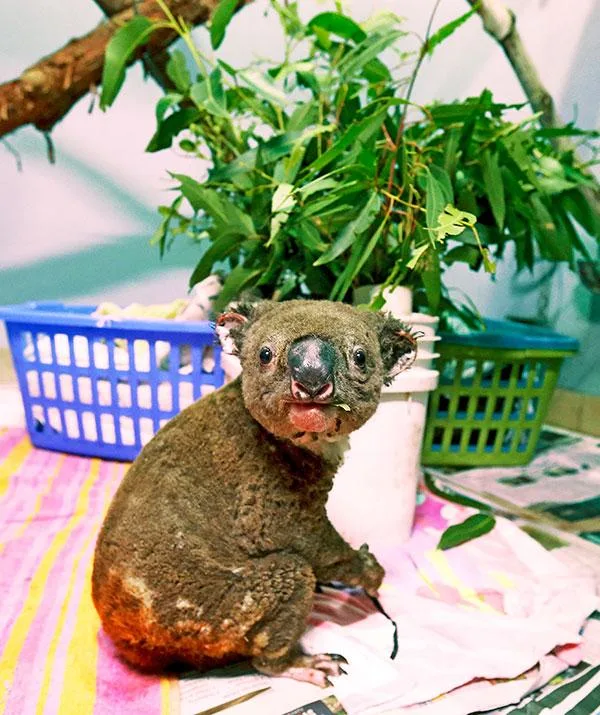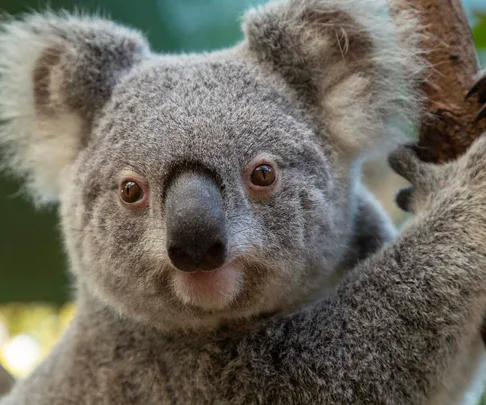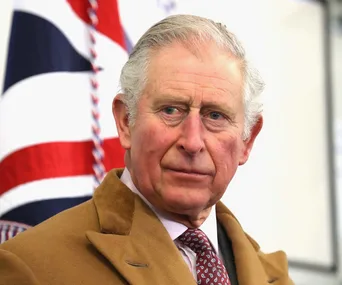Listening to the morning news, on Tuesday 12 November, Kristie Newton realised that the catastrophic fires in Queensland and New South Wales had created a wildlife emergency like no other.
“It is the worst crisis that WIRES [NSW Wildlife Information, Rescue and Education Service] has seen in our 30-plus year history,” she says, as we walk through tinder-dry bushland on the outskirts of Sydney.
“The number of fires, the intensity of those fires and the speed with which they’re moving – all this is very scary.”

Kristie Newton and WIRES colleague MJ Skulander with rescued koala Poppy. Photography by Alana Landsberry
It’s scary because of the sheer number of animals that have been affected, stretching volunteers to their limits, and because there has been severe habitat loss, which will mean food shortages and a lack of safe places to release animals when they recover.
“This is going to impact these species for decades,” Kristie says.
WIRES volunteers are led into fire zones by Rural Fire Service or National Parks officers after the fire has passed. Just last weekend, Kristie was part of a rescue team working in areas devastated by the Gospers Mountain fire.
“When we first went out, myself and a colleague, there was nothing – there was almost no life. We were there for half a day and we saw one bird – it was a tiny finch.”
“We were so excited to see an animal that was alive. It’s incredibly eerie, it’s almost like being on a different planet. There’s no colour left – everything is sepia – and it is completely silent because there are no birds singing and no cars on the road, and it’s smoky.”
“That first day, we managed to get a koala out. His name is Oden and he had burnt paws and was very dehydrated.”
“He was actually spotted by some arborists, and they came and got us and we managed to get him down safely. He’s currently in care and doing well, and all our fingers and toes are crossed that he will make it.”

“We did get a second koala out on the next day. His name was Caramello – he was named by the tree services guys – but he had worse burns on his paws than Oden and he died a couple of days later. There were lots of tears in the office, mainly by me… There were a few really sad moments that day.”
Lewis, the koala rescued by NSW woman, Toni Doherty, also died from his burns. There have been estimates of more than 1000 koalas dead in the recent fires, although Kristie believes it is still too early to count the losses.
In any event, it seems clear that the much loved marsupials (which were already facing extinction by 2050 as a result of habitat loss and disease) have been pushed to a tipping point.
Kristie has seen many animals too ill to rescue. In those instances, she says, “we have vets on standy who can euthanase them, and we also have a licensed shooter with us, so they are euthanized by firearm on site…”
“On the second day we were there, there were seven that just… it was heartbreaking to see them. They had burns to basically all of their paws and were really struggling to even move. It was a very, very tough day.”
“I get emotional talking about it… but it was necessary and I’m again glad we found them and they didn’t have to suffer any more.”
WIRES volunteers and other animal rescue organisations around the country are under extraordinary pressure at this time. Here’s how we can all help:
“There are simple things that everyone can do,” says Kristie, “like putting out water in your yard. That is literally lifesaving for some of these animals.”
“Even if you’re not in a fire zone, we’re coming into summer – very, very hot days – and animals need water. So if people can just put out bowls of water in a shaded place and put a rock or a stick in it so little animals can get out of it safely, that can makes a world of difference. And if you see animals that you think might be suffering, just give us a call.”
In NSW, you can also train to become a WIRES volunteer, caring for or rescuing native animals.
“We always need more people, fires or no fires. The demand for wildlife assistance for us has increased 20 per cent every year, for the last few years, and that’s just going to keep increasing.”
And finally, you can make a donation to WIRES or a local wildlife organisation.
WIRES is a wildlife rescue and rehabilitation organisation, with 2500 volunteers and 28 branches across NSW.
For more information, visit their website here.



